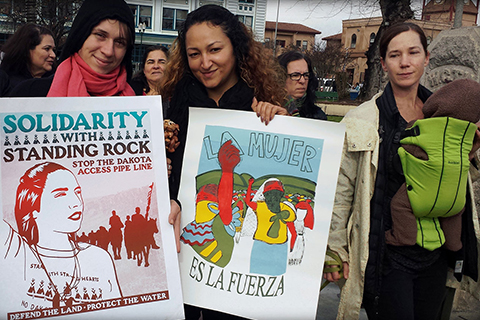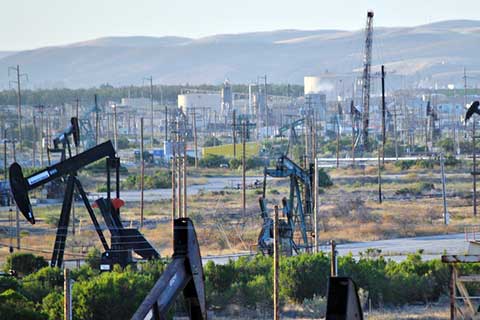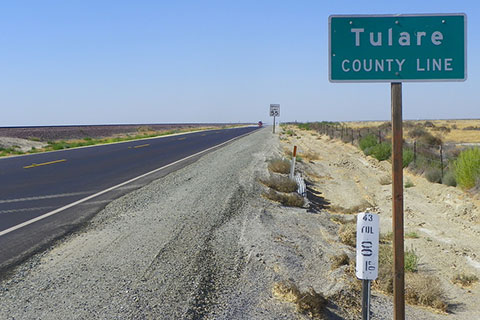Feature Archives
Mon Jan 30 2017
Keystone XL, Dakota Access Pipelines Back on Table
President Trump signed executive orders on January 24 to push ahead with the controversial Keystone XL and Dakota Access pipelines. Both projects sparked widespread opposition and protests, especially because of their risks to water, wildlife, climate and people. On January 27, attorneys representing the first ten water protectors arrested in actions against the Dakota Access Pipeline in early August 2016 renewed their motion for a change of venue, on grounds that the state did not adequately respond to their motion and is not taking basic steps to assess bias among jurors.
Sun Jan 29 2017
Police Warrant Heightens Concerns Over In-Home Microphones
A warrant from police in Arkansas seeking audio records of a man’s Amazon Echo has sparked an overdue conversation about the privacy implications of “always-on” recording devices. The story serves as a wakeup call about the potential surveillance devices that many people are starting to allow into their own homes. The Amazon echo is not the only such device; others include personal assistants like Google Home, Google Now, Apple’s Siri, Windows Cortana, as well as other devices. Digital assistants and other IoT devices create a triple threat to privacy: from government, corporations, and hackers.
Wed Jan 25 2017 (Updated 02/09/17)
Oakland Land Reclaimed for Housing by Homeless Residents and Activists
On the morning of Saturday, January 21, a network of Oakland community members took over Marcus Garvey Park, a public plot of land at 36th Street and Martin Luther King, Jr. Way, moving in small homes, a hot shower, a healing clinic, and other services — declaring it a people’s encampment for those who need housing and basic needs and services. The group which includes folks living on Oakland streets, activists from Feed the People and Asians for Black Lives said that the move-in demonstrates their ability to provide what the City of Oakland cannot to its most vulnerable residents.
Sun Jan 22 2017 (Updated 01/29/17)
Millions of Women Take a Stand Against Trump the Day After Inauguration
On January 21, one day after Trump was inaugurated as the 45th President of the United States, women and allies in cities across the U.S. and countries throughout the world marched in protest in record numbers. In Washington, D.C., where the original Women's March was called, around 500,000 attended, far more than had come for the Trump inauguration itself. In Los Angeles, some estimates set the number present at nearly 750,000. Some of the largest marches in Northern California were in Oakland, San José, San Francisco, Sacramento, and Santa Cruz.
Mon Jan 16 2017 (Updated 01/22/17)
Reclaiming King's Legacy in the Age of Trump
For the third year in a row, actions will be held across the Bay Area to “Reclaim King’s Radical Legacy." In previous years, protests and rallies culminated with a large march in Oakland on Martin Luther King Day. This year, with Trump set to be inaugurated as the President of the United States on the Friday after MLK Day, protests will be held over five days, from MLK Day on January 16 through to the inauguration of Donald Trump on January 20. A diverse coalition will engage in 120 hours of direct action, coalition building, and campaign launching against white supremacy.
Sat Jan 14 2017 (Updated 01/16/17)
California Agency Proposes Turning Monterey County Aquifer Into Oil Waste Dump
Just months after Monterey County voters approved a ban on underground injection of oil waste, California regulators have announced a plan to turn an underground water supply in the county over to the oil industry for injection of contaminated waste fluid. The proposal — announced by California's Division of Oil, Gas and Geothermal Resources — seeks to exempt an aquifer that runs under the town of San Ardo from the federal Safe Drinking Water Act. A similar aquifer exemption is currently under consideration in Livermore.
Tue Dec 20 2016 (Updated 12/21/16)
Tulare County Has Most Agricultural Pesticide Illnesses in California
The California Department of Pesticide Regulation (DPR) released a report last week detailing the 2014 results of their Pesticide Illness Surveillance Program. The report, documenting all reported pesticide-related illnesses from all California counties, shows 20.1% of agricultural pesticide-related illnesses occurred in Tulare County, making it the county with the most agricultural pesticide illnesses in the state. Santa Cruz County came in second with 17.2%. Of the 53 counties with documented pesticide-related illnesses in 2014, Tulare County accounted for over 1 in every 5 cases of poisonings from agricultural pesticides.








